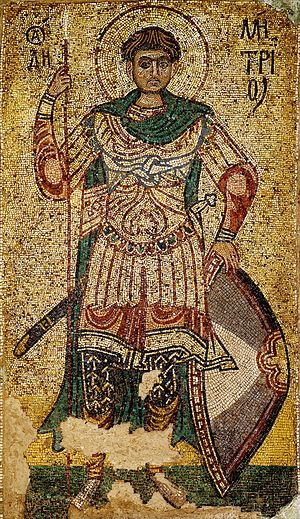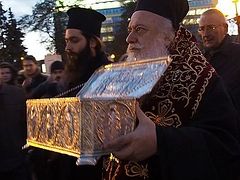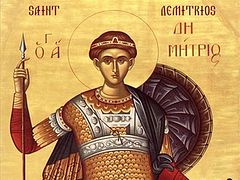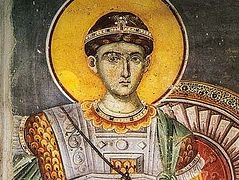Distribute earthly riches, for we shall seek heavenly riches for ourselves.
Greatmartyr Demetrios of Thessaloniki
In the Name of the Father, and of the Son, and of the Holy Spirit!
My beloved brothers and sisters in Christ!
It was a great festive occasion in the ancient city of Thessaloniki when a long-awaited son was born to the family of a Roman proconsul which had been childless for many years. On this occasion the parents arranged a feast for the whole city, treating paupers and cripples especially generously. Thessaloniki residents who shared the simple human joy of their ruler could not have imagined how grace-filled the mysterious cause of their jubilation was. The baby that was born on that day not only was a gift from God for the proconsul’s family, but also became a pillar, protector and heavenly patron of his native city for many centuries.
 Demetrius of Thessaloniki. A mosaic of the Cathedral of Archangel Michael at St. Michael’s “Golden-Domed” Monastery in Kiev The Greek city of Thessaloniki (“Solun” in Slavonic) is filled with early Christian glory. It was here that the great Apostle Paul, “the apostle to the nations”, established a Church of Christ and sent two of his God-inspired epistles to its residents, which are included in the New Testament. And while other Churches he had founded distressed and worried him by their instability in the faith, he wrote to the Christians of Thessaloniki the following: ye are our glory and joy (1 Thess. 2:20); …We ourselves glory in you in the churches of God for your patience and faith in all your persecutions and tribulations that ye endure (2 Thess. 1:4). Greek pagans would fall on Christians of Thessaloniki with a rage that was no less intense than that of Jews, the enemies of God, yet the Church of Thessaloniki stood firm in faith and piety. Encouraging the faithful, the Apostle Paul wrote: We give thanks to God always for you all, making mention of you in our prayers (1 Thess. 1:2). And the prayer of the apostle for Thessaloniki became everlasting when he entered the Heavenly Kingdom after his glorious martyrdom. Through holy Apostle Paul’s prayers the Lord raised up His valiant heroes in Thessaloniki—the enlighteners and keepers of the city. Of them the brightest star was the boy who was born in the late third century A.D. to the family of a Roman governor.
Demetrius of Thessaloniki. A mosaic of the Cathedral of Archangel Michael at St. Michael’s “Golden-Domed” Monastery in Kiev The Greek city of Thessaloniki (“Solun” in Slavonic) is filled with early Christian glory. It was here that the great Apostle Paul, “the apostle to the nations”, established a Church of Christ and sent two of his God-inspired epistles to its residents, which are included in the New Testament. And while other Churches he had founded distressed and worried him by their instability in the faith, he wrote to the Christians of Thessaloniki the following: ye are our glory and joy (1 Thess. 2:20); …We ourselves glory in you in the churches of God for your patience and faith in all your persecutions and tribulations that ye endure (2 Thess. 1:4). Greek pagans would fall on Christians of Thessaloniki with a rage that was no less intense than that of Jews, the enemies of God, yet the Church of Thessaloniki stood firm in faith and piety. Encouraging the faithful, the Apostle Paul wrote: We give thanks to God always for you all, making mention of you in our prayers (1 Thess. 1:2). And the prayer of the apostle for Thessaloniki became everlasting when he entered the Heavenly Kingdom after his glorious martyrdom. Through holy Apostle Paul’s prayers the Lord raised up His valiant heroes in Thessaloniki—the enlighteners and keepers of the city. Of them the brightest star was the boy who was born in the late third century A.D. to the family of a Roman governor.
This blessed child’s father, a proconsul of Thessaloniki, was not the average Roman official, most of whom were conceited, hard-hearted, and mercenary people. But the governor of Thessaloniki did not humiliate or rob citizens of the province were he was in charge—he was fair, gave alms generously to people, and the needy could always come to his house, knowing that they would receive help. The proconsul and his wife were Christians in secret: it was a time when paganism was becoming ever fiercer in the face of the all-triumphant teaching of the Savior, and intensifying persecution. The family of the proconsul of Thessaloniki did not have the courage to confess the prohibited religion openly, so they prayed in the house church, performed acts of charity, and thus walked towards salvation. Beyond all doubt, the devout parents raised their son, whom they named Demetrios, in the holy faith.
Having learned divine truths from childhood, the young Demetrios was aflame with zeal for the Lord. He was no longer satisfied with the secret Christian life his family led—the ardent youth wished for more, namely to follow the sacrificial feat of Christ the Redeemer. He learned about the former glory of the Church of Thessaloniki and grieved over the destiny of his native city, seeing the worship of lifeless idols in it. St. Demetrios desired to become like the brave Thessalonians of the Apostle Paul’s age who had imitated him and the Lord, having received the word in much affliction, with joy of the Holy Ghost (1 Thess. 1:6).
The proconsul trained his son for Roman service as well; so St. Demetrios acquired skills in administrative matters, the courage of a soldier and experience of a commander. The Roman Empire was pleased with the governor of Thessaloniki; this province would repulse enemy raids, there were no riots there, and no complaints came in because the Thessalonians loved their kind ruler. So, when the proconsul died, Emperor Maximian summoned his son and, convinced that Demetrios had inherited his father’s intellect and valor, appointed him as his successor.
Maximian was a staunch opponent of Christianity. Giving instructions to the young Thessaloniki governor, the Emperor said to him: “Put to death all who will invoke the name of the Crucified One.” The persecutor did not have the slightest idea that he was sending a preacher of the Lord and not a bloodthirsty pagan to Thessaloniki.
Having returned to his home city, St. Demetrios set about glorifying our Lord Jesus Christ in public and teaching Thessalonians the holy faith. And his preaching was hugely successful: the people transferred their love for the reposed governor to his son; and, besides, St. Demetrios was notable for his particular intelligence and kindness, so the hearts of multitudes of people opened to his good tidings of the loving Lord. It seemed as if St. Demetrios had restored apostolic times to Thessaloniki: the city belonged to Christ again.
At that time the Emperor’s attention was distracted by a war in the Black Sea region. But on his way back from the campaign, the tyrant Maximian learned that the young Thessaloniki governor turned out to be a Christian and flew into a rage. The Emperor turned his army on the road to Thessaloniki to personally make short work of both St. Demetrios and the city’s Christian community.
Having ascertained that the information against St. Demetrios was true to the facts, Maximian threw him into prison and gave himself up to abominable pagan entertainment by arranging a gladiatorial combat. It gave perverted joy to demon-worshippers who would hide inside temples to be present at the scenes of murder, see blood stream and hear people’s groan and death rattle. The impious Maximian was avid to view such spectacles.
There was a fighter among the professional gladiator-killers, a German named Lyaeus, of whom Emperor Maximian was very proud. This “champion number one” of bloody games was described in this way: “This Lyaeus was a second Goliath—taller than all others, he had a beast-like appearance and character, and his voice resembled the roar of a lion. His glare and voice alone made everyone tremble. He was surprisingly sturdy, his strength was invincible, for unclean spirits dwelt in him, and therefore no one could withstand his attacks or challenge him. He had already killed a very large number of brave and strong people and he was adored by Emperor Maximian. Since Maximian could not be sated with human blood, he loved the one who devoted all his physical strength to spilling human blood.”
So the impious emperor chose this killer, his favorite, as the instrument of harsh punishment for the Thessalonian Christians, combining the brutal amusement of gladiatorial combat with the annihilation of the followers of the Crucified One.
A platform on pillars was raised in the city center, with numerous spears with their points upwards driven beneath it. The huge powerful Lyaeus was standing on the platform, and soldiers forcibly dragged Christians there one after the other so that they could fight with the ferocious “champion”. No one could challenge Lyaeus: he would hurl his opponents down the platform onto the pointed spears, and the pierced people died in agony.
The bloodthirsty Emperor and his retinue relished the spectacle, while Christians would grieve for the deaths of their brothers very bitterly. Among them was St. Nestor, a worthy young disciple of St. Demetrios. His heart was inflamed with the resolve to put an end to the outrage by fighting with Lyaeus and putting his power to shame in the name of the Lord. But before the single combat he went to prison to ask for his mentor’s prayers and blessing for this heroic deed.
Meanwhile, Greatmartyr Demetrios in prison was waiting for his crown of martyrdom with great spiritual joy. First the devil attempted to frighten the confessor: He disguised himself as a scorpion and tried to sting him. But St. Demetrios fearlessly trod on the enemy with the words from the psalm of David: Thou shalt tread upon the lion and adder: the young lion and the dragon shalt thou trample under feet (Ps. 90:13). And, lo and behold, the steadfast passion-bearer was found worthy of a vision of an angel of God who heartened him. Exulting, St. Demetrios exclaimed: “I will rejoice in the Lord, I will joy in the God of my salvation” (cf. Hab. 3:18).
Thus, standing on the threshold of the Heavenly Kingdom and foreseeing the events to come, St. Demetrios listened to his disturbed disciple’s account of the atrocities of Lyaeus. Blessing the youth to challenge the mighty gladiator, St. Demetrios predicted: “You will defeat Lyaeus and suffer for Christ.”
When a beardless, fragile young man came out of the crowd of Thessalonians and expressed his desire to fight with Lyaeus, the Emperor was surprised. In some sense Maximian even pitied the boy who would be “a sitting duck” for the ferocious German. But when he tried to dissuade Nestor from combat, the latter replied: “Even though I am small and weak, the power of my Christ is great and invincible; I trust Him and want to challenge this giant in His name.”
Hearing the name of the Savior that was hated by him, Maximian began to gnash his teeth and ordered the young Christian to rise on the platform immediately. Lyaeus, displaying his mighty biceps, met his slender opponent scoffing and was about to attack him with loud laughter. St. Nestor protected himself by the sign of the cross. And suddenly the impossible happened: The youth “seized the giant, as if he were a bird, and hurled him down the high platform onto pointed spears. Falling on them, Lyaeus died shamefully, with his accursed soul going to hell; and the memory of him vanished forever; his haughty strength disappeared, and Maximian no longer bragged vainly about his fighter.” The people, amazed and admiring the miracle, gave praise to the Lord Jesus Christ.
The death of the killer-giant enraged and shamed Maximian very much. The Emperor ordered St. Nestor to be executed immediately. And when Maximian was told that the young fighter had been encouraged and sent by St. Demetrios, he decided to subject the saint to the same death his “favorite” (Lyaeus) had died. The executioners burst into the prison when St. Demetrios was standing in prayer and transfixed the passion-bearer with spears. Thus the valiant warriors of Christ, St. Demetrios of Thessaloniki and his disciple St. Nestor, shone forth with the brilliant crowns of martyrs.
St. Lupus (Loupos), a faithful disciple of Greatmartyr Demetrios, collected the blood that had spilled out from his wounds onto a shroud and moistened his jeweled ring in the passion-bearer’s blood as a sign of the title of the ruler of Thessaloniki. With these relics, blessed by the greatmartyr’s precious blood, St. Lupus began to heal the sick, who on hearing about wonderful cures flocked to him from all over the city. Maximian was informed about that, and the furious Emperor ordered St. Lupus to be put to death as well. Thus the faithful servant followed after his great master to Paradise.
They threw the body of holy Greatmartyr Demetrios onto the road to be eaten by dogs and wild beasts, but no creature of God touched the precious remains of the passion-bearer. At night Thessalonian Christians took his holy relics and committed them to the earth in secret.
When the persecution stopped, a small church was built over St. Demetrios’s grave. Later, in the seventh century, a devotee of the greatmartyr of Thessaloniki decided to erect a magnificent and splendid church on this spot. The old structure was pulled down; and when they were digging a ditch for the foundations, St. Demetrios’s relics were uncovered—they turned out to be absolutely intact, with a flow of fragrant myrrh from them. According to the eyewitnesses’ evidence, the scent was so strong that the whole city was filled with fragrance.
The holy myrrh that streamed from the martyr’s relics could heal any diseases. Writing in the fourteenth century, the historian Demetrios Chrysologus stated: “This substance is more remarkable than any other fragrances—not only artificial ones, but also any of the natural ones created by God.” By virtue of his wondrous miracle of pouring forth myrrh from his tomb, the Church calls Greatmartyr Demetrios “the Myrrh-gusher” and sings to him: “The ever-flowing sources of thy myrrh gush forth.”
St. Demetrios, who had loved his earthly fatherland dearly, became a powerful heavenly protector of his city after his death. Many times did enemy troops flee from the city walls in terror, chased away by a fiery, radiant man on a white horse in snow-white garments—holy Greatmartyr Demetrios. During a formidable Avar invasion one devout Thessalonian was vouchsafed a vision of Greatmartyr Demetrios was praying to the Savior: “I know Thy bounties, O Lord, Master and Lover of mankind. Even the iniquities of the entire world cannot exceed Thy mercy. Thou didst allow Thy Holy Blood to be shed for sinners, Thou didst sacrifice Thy life for us. Thou didst ordain me to be the guardian of this city Thyself. Let me imitate Thee, my Master: let me lay down my life for its citizens. If Thou savest the city and its people, I will be saved as well; if Thou destroyest them, I will be destroyed with them.” Next day the one hundred thousand-strong Avar force without any obvious reason took to flight in disorderly confusion, leaving the catapults they had prepared to storm the city.
In the mid-sixth century, when famine was raging in Thessaloniki, a heavenly warrior appeared in plumed armor on ships and landing piers, ordering wheat to be taken to Thessaloniki. Thus St. Demetrios delivered his home city from calamity. St. Demetrios would also free his fellow
citizens from servitude in foreign lands—many of those who had been taken prisoner by the enemy invoked the name of their beloved intercessor of Thessaloniki and were miraculously taken back immediately to their native land by an invisible power.
Holy Greatmartyr Demetrios forbade his devotees to carry even a particle of his relics away from Thessaloniki. Thus, in the sixth century the Byzantine Emperor Justinian sent his heralds to Thessaloniki to translate a portion of the holy passion-bearer’s relics to Constantinople. But as soon as they approached his shrine, a pillar of fire shot up from it, and they were hit by a ray of sparks, with a voice saying from the flames: “Stop and do not dare!” However, Greatmartyr Demetrios of Thessaloniki deigned to grant one of the marvelous relics associated with his name to Russia—it was a plank from his coffin with the saint’s wonderworking icon.
In ancient times, pagan Slavic tribes made raids on Thessaloniki most often—it was they that St. Demetrios drove away from the city by his miraculous apparitions. However, having been enlightened by the light of the Gospel of Christ, the Slavs at once recognized the holy passion-bearer of Thessaloniki as one of their heavenly protectors.
The Roman Empire would choose its officials from among the ablest people living in the regions under its control regardless of nationality. In those times many Slavs settled in Thessaloniki, and some of them came to serve Rome. Thus, the proconsul of Thessaloniki, St. Demetrios’ father, was neither Greek nor Italic: he was a Slav. It is no coincidence that Greatmartyr Demetrios was mainly considered as a Slavic saint in the Byzantine Empire. In 907, when Prince Oleg defeated the Imperial forces near Constantinople and “nailed his shield to the gates of Tsargrad [“the Emperor’s City”—the Slavic name for the city of Constantinople.—Trans.],” according to a chronicler, “the Greeks were terrified and exclaimed, ‘This is not Oleg, but St. Demetrios, whom God has sent against us.’”
In Russia the liturgical veneration of St. Demetrios of Thessaloniki began right after the Baptism of Rus’. In as early as the eleventh century St. Demetrios’ Monastery was founded in Kiev, the capital of Rus’, and it was there that a mosaic of St. Demetrios was created. And when the city of Vladimir became the new capital, St. Demetrios’ Cathedral was founded there, and Venerable Andrei Rublev the Iconographer painted an image of the Passion-bearer of Thessaloniki on its column. The first stone church of the Moscow Kremlin, built by holy Right-Believing Prince Daniel of Moscow, was dedicated in honor of Greatmartyr Demetrios. Later it was replaced with the principal church of Russia—the Dormition Cathedral with one side-altar dedicated to St. Demetrios.
Both Grand Princes Iziaslav I of Kiev (c. 1024—1078) and Vsevolod III “the Big Nest” of Vladimir (1154—1212) were baptized as Demetrios / Dimitry, having chosen the greatmartyr of Thessaloniki as their heavenly patron. But the greatest Russian ruler to bear this holy name was holy Right-Believing Prince Dimitry Donskoy: the pillar of his motherland and Church, who took care of churches of God, preserved the Russian land by his courage, crushed many enemies that rose against us, and built marvelous walls around his glorious city of Moscow.
In the late twelfth century, a wonderworking icon of Greatmartyr Demetrios that had been painted on his coffin plank was transferred from Thessaloniki to Vladimir. And in 1380, just before the Battle of Kulikovo, holy Right-Believing Prince Dimitry Donskoy solemnly transferred this holy image from Vladimir to Moscow to ensure the blessing of the wonderworker of Thessaloniki for fighting against the formidable Mamai.
The Battle of Kulikovo became the first significant victory of the Russian forces over the Tatar-Mongols of the Golden Horde, but thousands of Russian soldiers were left lifeless on Kulikovo Field. It was then that the Russian Church instituted for all times the special annual memorial service to be celebrated for the repose of the warriors fallen for their fatherland, called “St. Demetrios’ Saturday” in honor of the greatmartyr of Thessaloniki. And the first priest to hold this memorial service was St. Sergius of Radonezh, “the Abbot of all Russia”, and among those who then prayed for the repose of the Russian soldiers was holy Right-Believing Prince Dimitry Donskoy.
From ancient times up to the present day, the name “Demetrios / Dimitry” has been one of the most popular among Russian people. The image of this valiant warrior of Christ—St. Demetrios of Thessaloniki—became so close and dear to people’s consciousness, that old Russian tales refer to him not as to a mere “Slav” but as to a “Rusich” [a native or inhabitant of Ancient Rus’.—Trans.].
A Slav by blood and a Thessalonian by birth, holy Greatmartyr Demetrios became both the guardian of Thessaloniki and patron of the Slav Churches. Looking at the example of this valiant hero, let us keep with awe the love both for our own Russian people and the land of Central Asia, where there are several churches in honor of Greatmartyr Demetrios.
Dear brothers and sisters in Christ!
For the salvation of the souls of his fellow-citizens, out of great love for them, St. Demetrios of Thessaloniki had the courage to undertake the feat of Christian preaching amid savage persecution, fearing neither suffering nor death itself. And we, though we call ourselves Christians, seem to be afraid of our own shadows and amid the faint-heartedness and fears of this life, and we not only tend to forget our neighbors but also neglect the salvation of our own souls. We rely not on God the all-powerful Sustainer but on calculations of politics and economics, failing to understand with our feeble minds that both are in the powerful hand of God.
The worries of our time will not change into the desired peace until we acquire inner peace ourselves and our hearts are filled with trust in the merciful Lord. In the hope of that, let us call out to the heavenly patron of our Church, St. Demetrios of Thessaloniki: “With the streams of your blood, O Demetrios, God Who gave you invincible strength, has dyed the Church in royal crimson and preserved your city invulnerable, for you are its fortification1.” Amen.



